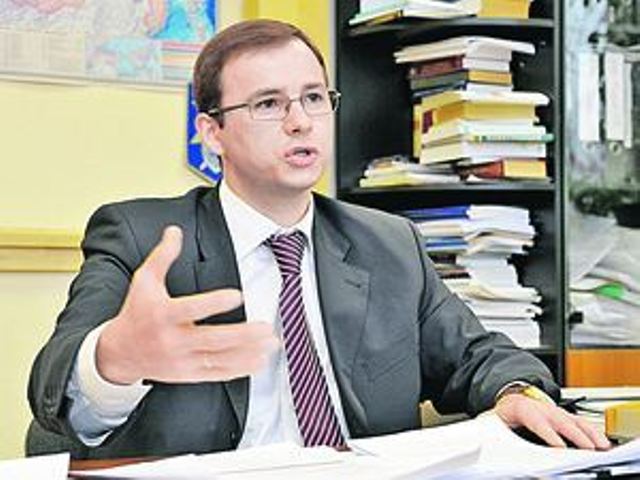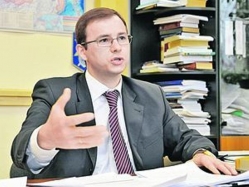Interview by Head of Department for Control over Investigation of Corruption Crimes of the Russia’s Investigative Committee V. Makarov to news agency ITAR-TASS

To make the corruption unprofitable is the main task of the society – representative of the Russia’s Investigative Committee Vladimir MAKAROV
On the eve of the second anniversary of the Investigative Committee of the Russian Federation (SKR) Head of Department for Control over Investigation of Corruption Crimes of SKR Vladimir Makarov told in his interview to ITAR-TASS about the results of full-scale battle against corruption, how search for property of corrupt officials is going on and in which spheres corrupt officials are caught most often.
- Mr. Makarov, the Oboronservis case resounded at the end of last year. Does this mean that the measures included in National Anti-Corruption Plan start working and the number of corruption cases started growing sharply?
- I would like to explain from the very start that the National Anti-Corruption Plan provides for a number of measures, where criminal prosecution is only one of the elements. The main aim is not growth in the number of revealed corruption crimes, but their reduction. If the Plan works efficiently the number of corruption crimes has to go down. Constant high number will tell us that something is wrong there.
The increasing number of corruption crimes revealed is connected in the first place with more active work of law enforcement and control bodies. Before the Oboronservis case investigators of the Investigative Committee over 9 month of the year initiated 16.6 thousand criminal cases over corruption crimes, which is by 42% more than over the same period previous year. The number of messages about corruption has also grown by almost a quarter – over 9 months there were more than 33.5 thousand. The criminal cases were initiated over each second message – in 56%.
The SK divisions have special investigators for dealing with crimes of officials and economic crimes, which also could not but affect the results. Over the first 9 months alone the cases against 4,636 officials were sent to court. Each fourth case was connected to bribe-taking (1,095), almost the same number – with frauds using official position (1,176). About 10% each are criminal cases over exceeding and abuse of office.
- Which spheres the most corrupt officials are caught in? Which agencies are among “leaders”?
- I wouldn’t make a direct connection between the number of those prosecuted and the level or corruption in a certain agency. Though of course it may indicate some problems in recruitment of staff. Unfortunately, sometimes our operative services are not particularly diligent about it, revealing crimes only there first of all where it is easy to do. But it is wrong to conclude there are only corrupt officials working there.
Among the “leaders” in the corruption crimes revealed are law enforcement agencies. In point of fact we are the best in catching ourselves. The divisions of inner security have started working better as well. Over 9 months only more than 1,600 law enforcement agents were prosecuted for corruption, including agents of internal affairs bodies for committing more than 5 thousand crimes.
The second in rank are healthcare and social provision – 714 persons were prosecuted for 3.3 thousand crimes. Science and education sphere is on the third place – we revealed more than 3 thousand crimes for which 531 people were prosecuted.
Considerably fewer corruption crimes are revealed in financial sphere, including banking and insurance, using budget funds and state procurement. Here we revealed more than 1.2 thousand crimes with 373 people having been prosecuted.
In such a vulnerable sphere as housing and communal facilities 112 people were prosecuted.
In all, over 9 months our investigators caught 5,360 people, who committed almost 19.5 thousand crimes.
I will repeat once more that revealing a corrupt official in a certain agency does not mean that the agency is corrupted altogether. The staff of the Interior Ministry is 1 million people and about 10 million in healthcare and social sphere and an absolute majority of them honestly implement essential for the whole society and state functions.
- Nevertheless, the Oboronservis case is more an exception or are there more such criminal cases?
- High-profile cases, including those over multi-million embezzlements are not so rare now. We have enough cases where subjects are high-ranking officials, including governors appointed by the president. We have recently sent to court the case against former Governor of the Tula Region Vyacheslav Dudka. Marat Faizov, former vice PM of the Penza Region has been sentenced to 7.5 years in prison and 12 million fine for taking a bribe from a businessman.
The Vologda court is hearing to the case against former first deputy governor of the Vologda Region Valentin Gorobtsov and his deputy – head of Department of housing and communal facilities Viktor Kudryashov charged with exceeding official powers. As a result of violation during placing a state order and formal acceptance of work on 35 million rubles, assigned from the Foundation of Assisting Reformation of Housing and Communal Facilities, they bought flats in two unfinished houses in Veliky Ustyug, which did not meet the requirements made to housing facilities. People got flats with kitchens of 2 square meters and a room of 5 or 4 square meters. The doorway was like a passage to a kennel – this was proper mockery. But formally officials gave an account of 30 flats.
- Do you manage to prosecute for corruption in the area of state procurement, where, according to some estimation, up to a trillion rubles goes on kickbacks?
- Our practice shows that a part of losses in the area of state procurement is due to banal embezzlement. There are two ways to embezzle: to buy something cheap at higher on the state funds price or sell cheap the state property. And here you can’t do without an official.
But investigators can’t interfere in transactions made on behalf of the state if there is no signal about the crime from any of the controlling or law enforcement bodies. Sometimes this signal comes a year or two later and then it is very hard to prove mercenary element.
There is about 100 criminal cases over corruption in state procurement investigated a year, if let out other violations in this sphere.
On the instructions of the RF President the violations in the purchasing expensive CT scans have been investigated since 2010. Over two years we have initiated 138 criminal cases, charged 11 persons, among whom 70 are former or current officials. This number includes 32 head of departments or ministries of healthcare in RF subjects. The total loss in these criminal cases constituted 4 billion 794 million rubles. The property worth 483 million rubles and shares in authorized capitals of companies have been arrested.
- That means that the loss is partly compensated?
- This is one of the investigation’s tasks along with finding the guilty ones. The damage in the criminal cases initiated before the Oboronservis case is 7 billion 904 million rubles. During the investigation 1 billion 252 million rubles has been repaid and 1 billion 212 million rubles of property was arrested.
But of course it is hard to do by only investigating operations, without any operative support. The operative work helps to untangle the ball made by financially competent thieves and to find out how and to whom this or that sum was transferred. But in some cases we can’t arrest property for further compensation of state loss without filing an action to the prosecutors to protect state interests.
Moreover, many have learnt since 90s to hide the money in offshore zones and when we send a request there they just transfer the money to another account. But we do try to find the stolen funds.
- Do you get any help from foreign colleagues?
- These relations are built on mutuality principle. We, for one thing, are very serious about implementing requests from abroad. But the attitude of our foreign colleagues is sometimes surprising: we don’t get any reply for a year or a year and a half. The majority of crimes in the area of state procurement and major embezzlements are committed using a corruption scheme of transferring the money including through offshores or foreign companies. That means that as a rule the embezzlement takes place through fouling the financial trail and without knowing whose company this is it is hard to finish investigation. In the state procurement, for example, we have forwarded about 30 requests on one European company, there hasn’t been any reply for almost a year now.
Over a year we have sent about 200 requests in corruption cases and usually to far-away countries: British Virgin Islands, Cyprus, Great Britain, United States, where a lot of companies are registered, Germany, France, Netherlands.
Our task is to make corruption unprofitable. So that a corruptionist feels that if they steal a million – they will lose 100 million, so one of the main tasks is to find property. For example, in one of the cases we have found that the subject of investigation had established three firms abroad and one in Russia and resold the equipment, which he had allegedly bought from the foreign companies, to our state purchaser at exorbitant price. But we produced documents stating that the foreign companies were registered on him.
- And have you managed to enter into cooperation concerning the criminal case initiated in 2010 over frauds with state purchasing of Mercedes cars from Daimler based on the investigation by the US Department of Justice?
- This investigation was rather interesting and basically the cooperation with our foreign colleagues was quite good. As a result we have a criminal case and suspects. It is now under investigation and it is too early to talk about some specific results.
- Does the law help to reveal corrupt organized groups?
- Russian Criminal Procedure Code provides for active repentance, thought there have been claims against it from international organizations – like it allows ungrounded escaping from legal responsibility for corruption. And now we have pre-trial cooperation agreements. For example, we investigated a single crime of taking a bribe by an official in the Interior Ministry of Buryatia. One of the accused repented and concluded a pre-trial agreement. As a result we revealed another 25 crimes committed by a group of officials, who during a number of years had registered transport means for bribes.
Over the previous year alone we sent to court 21 criminal cases over corruption crimes committed by organized groups and 4 – by criminal communities.
- Who is the main “supplier” of materials for investigating corruption – police, Chamber of Accounts, people?
- The most of messages on corruption we receive from interior bodies – about 16.5 thousand over 9 months, almost the same number – about 16 thousand – from people. The Federal Security Service has forwarded to us 1,100 messages, the Chamber of Accounts – 24, the Russian Federal Finance and Budget Control Service – 22.
In general the number of messages has grown a quarter over a year.
The aim of the work of the Investigative Committee is while implementing our tasks, to help people whose rights have been abused. And I think you are aware of the demand of the SKR Chairman Mr. Alexander Bastrykin: we must not leave a single citizen unheard, whether they address us directly, through Internet or on the phone. Any citizen can come and make an appointment with any head of our divisions. No application will stay unviewed.
Photo
15 January 2013 09:03
Адрес страницы: http://en.sledcom.ru/press/interview/item/507084/

 Распечатать
Распечатать 